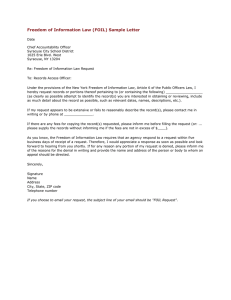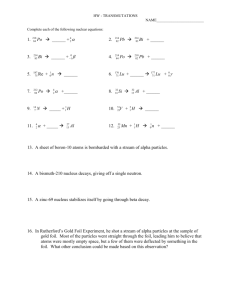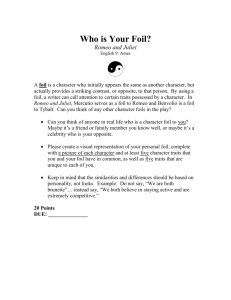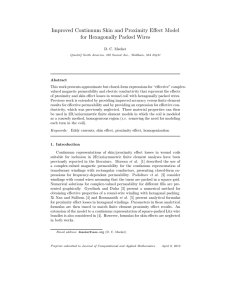Improved Continuum Skin and Proximity Effect Model for
advertisement
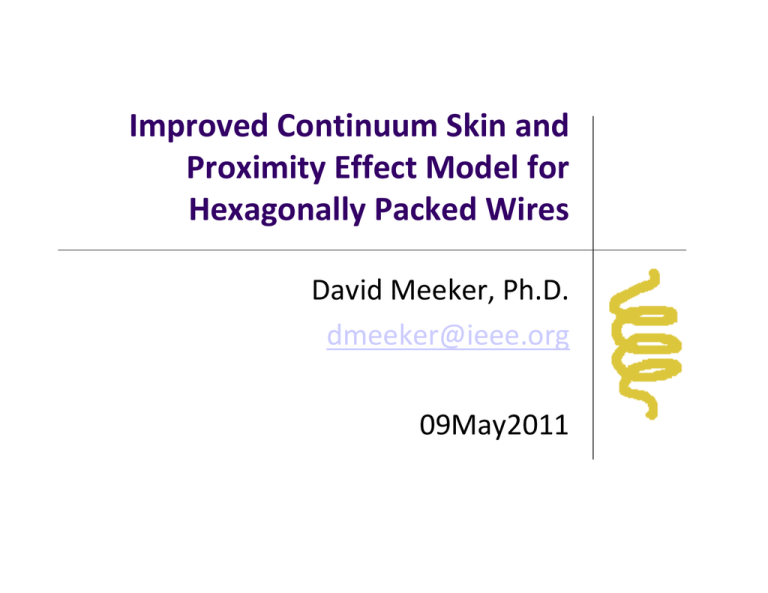
Improved Continuum Skin and Proximity Effect Model for Hexagonally Packed Wires David Meeker, Ph.D. dmeeker@ieee.org 09May2011 Induced currents • When conductors are exposed to a timevarying magnetic field, currents are induced • Losses that occur when conducting wires are exposed to a magnetic field • Known as “Skin Effect” and “Proximity Effect” Current density in a winding exposed to an AC magnetic field Skin and Proximity Loss Effects Skin Effect: Proximity Effect: • Net current flows in conductor • No net current in conductor • Current pushed towards surface of conductor by field due to current • Currents induced by externally applied field Motivation • Lots of elements needed to explicitly represent each wire in a coil • Desire a continuum method that lets us calculate accurate Proximity and Skin Effect losses • Proximity effect captured by a complex-valued bulk magnetic permeability • Skin effect captured by a complex-valued bulk conductivity • Concentrating on the case of Hexagonal Packing Equivalent Foil Model • Classical approach: Pretend winding is a set of foils/bars • Can be solved analytically for equivalent permeability, conductivity • Rigorously shows how discrete conductors can be represented as a continuum • Can pick foil properties that give an OK agreement to wire winging • Here, foil solution used as an approx form for fitting FEA results Equivalent Foil Problem Decompose problem into 3 sub-problems: Approximate Form for Curve Fit Analytical solution from foil with gap ε between foils: where b/(b+ ε) is foil’s fill factor Approximate form for fitting to FEA data: Where c1, c2, c3, c4 are functions of copper fill factor FEA Skin and Proximity Domains • For foil, easy to tell where to draw the boundary conditions. • For hex winding, no clear edges where foillike BCs can be defined • Instead, define slightly different domains that yield the same computational results. Parameter Fitting Approach • Define c2 in terms of c1 to exactly satisfy an analytical expression for low-frequency effective permeability • Define c4 in terms of c3 to exactly satisfy an expression for low-frequency / low fill factor effective resistivity • Assume cubic polynomial forms for c1 and c3 • Choose parameters to minimize the normalized RMS Error: Fit to Effective Permeability Fit to Effective Resistivity Example • • • • • • Coil with copper wire ID = 10.2 mm OD = 35 mm Axial Length = 11.8 mm 114 turns Consider wire diameters of 0.8, 1.0, 1.1 mm Exact and Approx Resistance Exact and Approx Inductance Conclusions • Approximate but closed-form expressions made for permeability and conductivity that accurately represent Skin, Prox effects in hexagonally wound coils • Expressions based on a form suggested by the analytical solution to equivalent foils • Parameters identified via curve fit to a large number of finite element results • Approach is now implemented in FEMM 4.2 and “automatically” applied to every wound coil.

